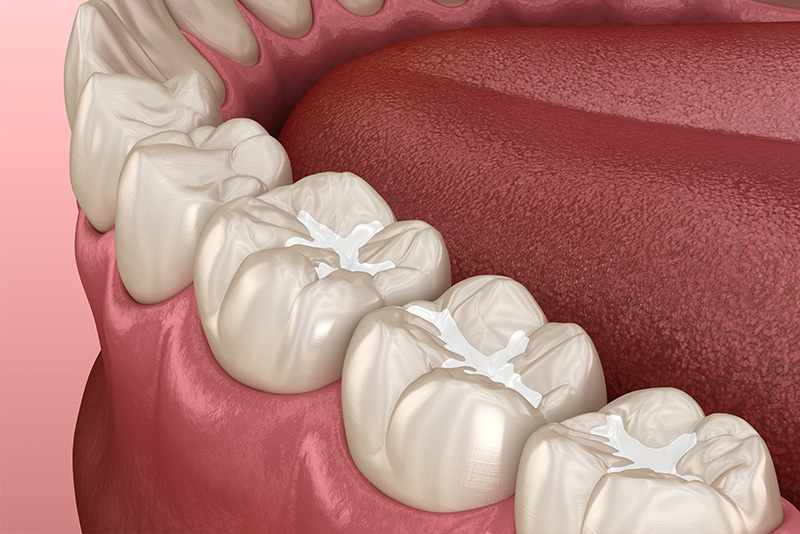As part of your child’s dental prevention program, dental sealants are often recommended to protect their permanent back teeth from developing dental decay. In fact according to the American Dental Association, dental sealants reduce the risk of cavities in molars by approximately 80%.
While establishing a good oral hygiene regimen, maintaining proper toothbrushing habits, and avoiding sticky sweets are essential for the prevention of dental decay, children’s teeth often need more protection. The reason for this is that the deeply grooved chewing surfaces of the back permanent teeth can be difficult for a child to keep free of leftover food and cavity-causing bacteria. Moreover, young children do not always brush their teeth, as often or as thoroughly as they should, making them particularly vulnerable to dental decay.


Dental sealants afford additional protection from dental decay by providing a strong plastic-like protective coating for the chewing surfaces of a child’s permanent back teeth. They basically fill in the pits, fissures and grooves on these teeth to seal out harmful bacteria and food particles. Beyond preventing the development of cavities, sealants may also be useful over areas of incipient dental decay to stop further damage from occurring.
Applying dental sealants is a relatively quick and painless process. They are simply brushed on in a series of steps during a child’s dental visit and then cured (set) with a light wand. Sealants are strong and durable and can last for several years. The condition of your child’s dental sealants will be evaluated at each checkup and reapplied if the need arises.
Dental sealants are a protective coating applied to the chewing surfaces of the back teeth (molars and premolars) to prevent cavities by sealing off grooves and crevices where food particles and plaque can accumulate.
While dental sealants are most commonly applied to children and teenagers, adults with healthy teeth and at a higher risk for cavities can also benefit from sealants.
The application of dental sealants is a quick and painless procedure. The tooth is cleaned, the sealant is painted onto the chewing surface, and then it is cured with a special light to harden it.
Dental sealants can last several years, but regular dental check-ups are important to monitor their condition. Your dentist will recommend reapplication if necessary.
No special care is needed for dental sealants. However, maintaining good oral hygiene practices, such as regular brushing and flossing, will help ensure their longevity.
Yes, dental sealants are highly effective in preventing cavities. Studies show that sealants can reduce the risk of cavities by nearly 80% in molars.
Yes, dental sealants are safe for both children and adults. They are made from safe, FDA-approved materials, and the application process is non-invasive.
No, dental sealants are an additional preventive measure, but they do not replace the need for regular dental check-ups and cleanings, which are essential for maintaining overall oral health.
If you notice any issues with your dental sealants, such as chips or wear, contact your dentist for an evaluation. They can determine if a repair or replacement is needed.